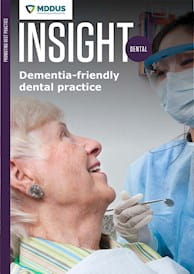ONE of the most common advice calls we receive at MDDUS is about ending the professional relationship with a patient.
This observation comes amidst a general feeling that the stresses and strains of the last couple of years have led to a “shortening of fuses” on all sides. A greater sense of perspective might have been an expected outcome of a global pandemic. Sadly, it seems the opposite is true (see Resolving patient complaints in this issue).
So how can we and should we say goodbye to that particular patient?
The ‘difficult’ patient
Thankfully, the majority of patients are reasonable and, with the understanding that many are a little nervous about a visit to the dentist, fine to treat. However, we all occasionally have that “heart-sink” moment when we see a certain patient’s name in our appointment book.
With the additional demands dentists are currently facing, it is entirely understandable that our tolerance levels for challenging behaviour might be waning. But there are a number of factors to consider before ending the professional relationship with a patient.
Exacerbating factors
It is wise to explore if there are any obvious reasons for a change in a patient’s behaviour. Has there been an issue with the advice or treatment they have received, or a miscommunication or misunderstanding in the practice? We cannot know everything about a patient, but it might be that something unpleasant is happening in their personal life, which has contributed to a recent outburst.
Throwing them into the arms of another
Keep in mind that if you decline to see a patient again, they will need to see another dentist. This might be one of your colleagues or a dentist working in a practice elsewhere. That new dentist will be obliged to assess the patient’s existing dentition and restorations, and report on their factual findings. This is when a perfectly maintained dentition might be noted or, to the contrary, a fractured endodontic file, secondary caries or deep periodontal pocketing is identified. Therefore, careful review of a patient’s dental record can be of value in helping to decide whether you will see them again.
Timing
An important factor to contemplate before ending a patient relationship is whether the patient is in the middle of a course of treatment or simply expecting a routine dental check-up. If mid-treatment, there is a duty of care which would necessitate greater involvement in helping ensure continuation of care.
A patient in Scotland will still be entitled access to emergency care for three months after a practice submits a GP200 (patient withdrawal) form to the health board. The exception being an agreement with the health board that negates the need for three months of emergency care, as the patient’s behaviour has been so serious as to warrant a police incident number.
Another aspect to consider is whether the timing of ending a professional relationship has been influenced by a patient complaint. GDC Standard 1.7.8 states:
“In rare circumstances, the trust between you and a patient may break down, and you may find it necessary to end the professional relationship. You should not stop providing a service to a patient solely because of a complaint the patient has made about you or your team.
Before you end a professional relationship with a patient, you must be satisfied that your decision is fair and you must be able to justify your decision. You should write to the patient to tell them your decision and your reasons for it. You should take steps to ensure that arrangements are made promptly for the continuing care of the patient.”
Given this guidance, your written response to a complaint is generally not the point at which to inform a patient that you will no longer see them. Instead, it is wise to resolve the complaint and then re-evaluate the professional relationship afterwards.
Threshold reached
There is a clear difference between an “awkward customer” and someone who has crossed the threshold of displaying explicitly abusive and/or aggressive behaviour towards you or staff members. In situations like this, it is worth reviewing your practice policy regarding patient behaviour, discussing it with your colleagues and considering whether there is clear evidence that this threshold has been reached. Naturally, any practice owner has a duty of care to staff members and this level of behaviour is a clear justification to decline future access.
Going quietly
Sadly, that difficult patient generally never leaves quietly when they are told that you are not going to see them again – so it is worth being prepared for a written complaint. It may seem counterintuitive, but if a patient is being told that they will not be seen again in the practice, it is generally wise to let them know about the practice complaints procedure. Complaints are almost always best dealt with at practice level with the help of your indemnifier rather than escalated to the area team, health board or GDC.
Ending the relationship
So, if after all of the above careful consideration, you are still of the view that trust in the professional relationship has gone and it is in no one’s best interests for it to continue, there are some additional process points to think about.
Firstly, if you and the patient simply cannot get along, is there a possibility that they could instead be seen by one of your colleagues in the same practice rather than being declined any future access? Sometimes hearing similar advice from another dentist will be enough for a patient to form a new, more amicable professional relationship.
NHS Providers have an overriding responsibility for all patients seen on an NHS basis in their own practice in England and Wales. It is their decision as to whether a patient will be seen again or as a last resort the patient will be declined access to the practice. The NHS Provider is responsible for writing to the patient and explaining the reasoning, with the understanding that this decision could be reviewed by NHS England or the Welsh health board.
In Scotland or Northern Ireland, it is the dentist with whom the patient is registered on an NHS basis who would make the decision about engaging with the health board to seek removal from their list. Again, according to GDC Standard 1.7.8, the patient would need to be informed of the reason in writing.
For a patient seen on a private basis, it is the discretion of the treating dentist and practice owner whether to continue the professional relationship, taking into account all of the above listed considerations.
Parting words
As with any relationship, things are not always straightforward and, frequently, there is no easy way to call an end. It is, of course, imperative that there is trust in a dentist-patient professional relationship, and good communication is often the key.
Carefully consider the reasoning and the possible consequences in deciding to part ways and if in doubt seek advice from MDDUS.
This page was correct at the time of publication. Any guidance is intended as general guidance for members only. If you are a member and need specific advice relating to your own circumstances, please contact one of our advisers.
Read more from this issue of Insight Dental

Save this article
Save this article to a list of favourite articles which members can access in their account.
Save to library



